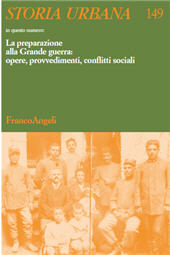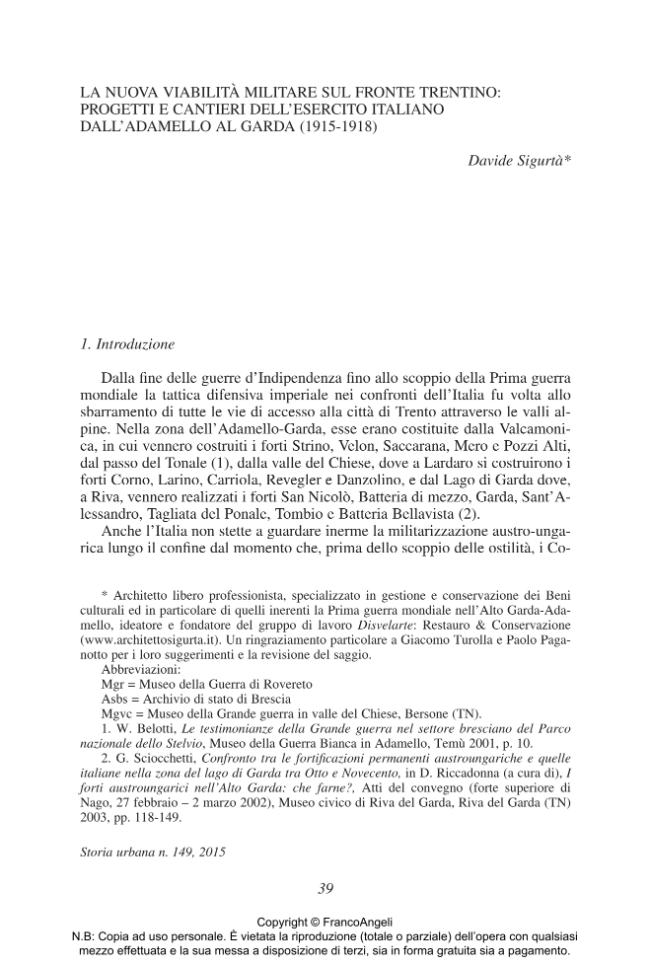La nuova viabilità militare sul fronte Trentino : progetti e cantieri dell'Esercito Italiano dall'Adamello al Garda (1915-1918)
39-68 p.
Fino allo scoppio della Prima guerra mondiale i territori montani dell'alto Garda e dell'Adamello si presentavano sostanzialmente disabitati e solo nelle aree a bassa quota della zona gardesana si erano formati piccoli abitati collegati fra loro ma fruiti solo dalle popolazioni locali. Nel comprensorio dell'Adamello, per la presenza dell'imponente ghiacciaio, la presenza umana era ed è concentrata nei paesi di fondovalle della Valcamonica e le profonde valli di accesso al ghiacciaio erano prevalentemente utilizzate per l'allevamento stagionale di animali da pascolo e, dalla fine del XIX secolo, dai pionieri dell'escursionismo montano. Quando, allo scoppio delle ostilità, ci si rese conto che l'imponente sbarramento che gli austriaci avevano realizzato - con la costruzione di forti e altre opere militari - nelle valli di accesso a Trento avrebbe spostato l'attività bellica sulle montagne dell'Adamello e dell'alto Garda, si rese necessario realizzare un sistema infrastrutturale diffuso per poter svolgere le azi
oni militari, movimentare il materiale bellico e le truppe. Il saggio indaga tale imponente attività, che vide coinvolto il Genio militare nella progettazione di strade, trincee, depositi e altre opere che potessero garantire, in sicurezza, l'accesso a zone fino ad allora ritenute impervie. Si realizzò, con grandi sforzi, una maglia viaria diffusa e gerarchizzata in rapporto alla posizione del fronte di battaglia principale o delle linee di difesa secondarie secondo progetti che univano l'impiego di materiali facilmente reperibili in loco e modalità costruttive semplici. La massiccia opera edificatoria finì per modificare in modo sostanziale la fruizione e la percezione della montagna che fino alla guerra era riservata ai pochi abitanti locali. Quei luoghi, prima impervi, divennero facilmente accessibili anche al turismo e quelle opere, edificate per resistere nel tempo e oggi riutilizzate per nuovi scopi, hanno irreversibilmente mutato il rapporto fra tra uomo e paesaggio.
Until the outbreak of the First World War, the upland areas of the Upper Garda and Mt. Adamello were uninhabited, apart from the lower areas of Lake Garda, where small villages had developed over time. These - all connected - were lived in only by local inhabitants. Due to the presence of the imposing glacier, in the area of Mt. Adamello, the inhabitants were clustered in the valley line villages of the Valcamonica, and the deep valleys which connected the valley line to the glacier, had mostly been used for seasonal pasture and, from the end of the 19th century, by pioneers of mountain tourism. After the outbreak of the hostilities, the Italian army realized that the impressive military barrier of fortresses and other military constructions - which the Austrians had built along the valleys which lead to Trento - would bring about the shift of war activities to Mt. Adamello and the Upper Garda mountains. For this reason, a diffused road system had to be realized to facilitate military actions and to handle wa
r materials and troops. The essay analyses this important activity managed by the military Engineers Corps, who designed roads, trenches, dumps and other constructions which could ensure secure access to those impenetrable areas. With a huge effort, a diffused road system was realized. The characteristics of each route were related to the position of the main front line or the secondary defensive lines, following projects which considered the use of local building materials and of simple constructive practices. The massive infrastructural system which was then realized, completely changed the way of using, and the perception of, those mountain areas, which, until the outbreak of the War, were lived in only by local inhabitants. Those places, once inaccessible, became tourist destinations and those constructions, built to survive over time and today converted to new uses, have completely changed the relationship between man and landscape.
Ist Teil von
Storia urbana : rivista di studi sulle trasformazioni della città e del territorio in età moderna : 149, 1, 2016-
Artikel aus derselben Ausgabe (einzeln erhältlich)
-
Informationen
ISSN: 1972-5523
KEYWORDS
- Adamello Lago di Garda Genio militare Viabilità militare
- Mt Adamello Lake of Garda Military Engineers Corps Military road system



